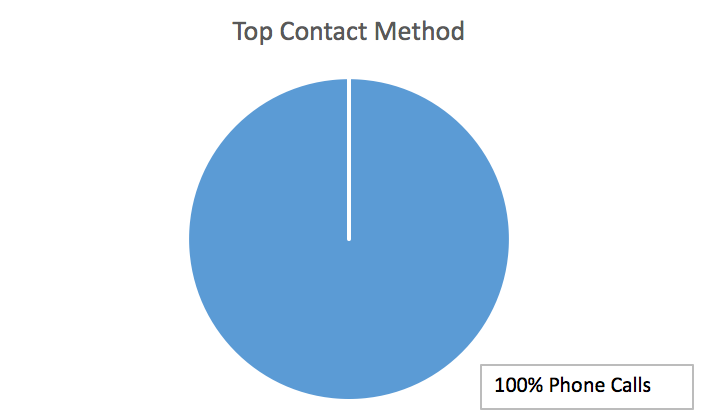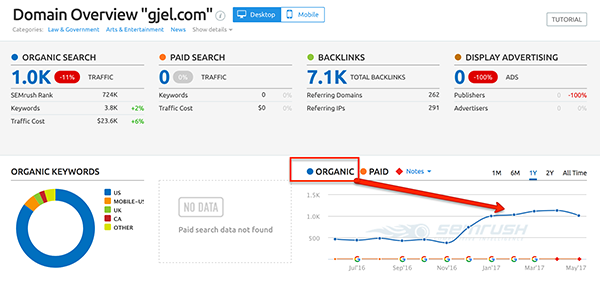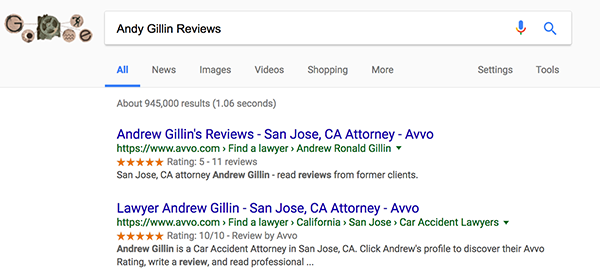1. Your website isn’t mobile friendly 🙁
Over 60% of searches today take place on mobile devices (Don’t believe me? Take a look at your own analytics data!). Surprisingly many law firms are still using websites based on old technology that doesn’t resize to the size of users devices. Not only will this drastically affect conversion rates, it will also minimize how you show up in search results.
Way back in 2016 Google already started minimizing the visibility of non-mobile friendly websites in mobile search results. This means that if a user was searching on their mobile device and your website wasn’t up to their standards, then you’re probably not going to be shown.
Even if you think your website is mobile friendly you should check it out to be safe. You can run a free online test by clicking this link: https://search.google.com/search-console/mobile-friendly
Once the website loads, simply enter your website URL and select “Run Test”

The result will be a simple answer. If your website is mobile friendly you should get a “Page is Mobile-friendly” confirmation in green as shown below. If you pass this test, move on to step #2.

If you didn’t pass this test it’s time you think about upgrading your law firm’s website.
Website Requirements & Suggestions
We know websites can be intimidating. Here are some requirements you should seek in a new website.
- Design & develop the website in WordPress. WordPress is a content management system we recommend you build your website on. It’s the most common out there so you can easily find people to work on it if you need help in the future. While some CMS’s allow for a mobile friendly experience on paper such as WIX, there are other issues that come along with this.
- Ensure it’s a responsive design. There are multiple ways to build mobile websites. If SEO is a concern the choice you will want to go with 99.9% of the time is responsive. This means the website layout will change depending on the users device. If someone says otherwise you should question it and find out why.
- Avoid separate SEO & website companies. SEO and Website design & development are more closely tied together than ever. A common problem we see law firms facing is when they hire a design agency to make their website when they’re not versed in conversions for law firms or the long term ROI of the project. Using different vendors usually means 2x work or paying for another website.PS: We recommend working with a company that specializes in Law Firm SEO.
- Site speed is important. Make sure your website loads in the 80th percentile for website speeds using Google’s Page Speed Insights test.
- Avoid bulky themes. Some law firms choose to buy cheap themes and implement them as a “design”. The problem with this is that they’re typically very bulky which reduces page load time. I should also mention that many use a variety of plugins which are open to security breaches.
2. Your Website Doesn’t Have a Click To Call Option
Recently I finished interviewing over 30 law firms who are very successful at online marketing. Do you know what the highest converting contact method was? 100% of them indicated they sign the most cases through phone calls.

Think about how easy it is for someone to contact you on a mobile phone these days. All they have to do is click on your phone number if your website is configured properly.
In the video below you can watch as I show you the difference between a non-responsive design and a proper responsive website design.
Did you notice that the “good example” website, GJEL.com had a clickable phone number that scrolled down the page with the user? This means the user can convert easily no matter where they are on the page.
Now it’s time to check your website. Start by pulling up your website on your mobile phone. Here are the tests it should pass:
- Does it have a phone number visible? (you should have a visible phone number)
- Is it easy to click on or do you have to zoom in? (you should not have to zoom)
- What happens when you click on it? Does it call your firm? (it should)
- Scroll down the page, does it follow you? (it should)
- Click on links to other pages. Does it meet the above criteria?
If your website failed any of the tests above you should get it fixed immediately through your website developer.
Bonus Tip: Your marketing organization should be able to tell you how many people clicked on the phone number to call you. If not, they don’t have goal tracking setup properly in Google Analytics. You can also setup dynamic number insertion if you want to track it on a macro level.
3. Nobody Can Find Your Law Firm in Organic Search Results
Is your SEO agency telling you you’re the best in the market but the calls and contacts don’t seem to add up? Organic traffic is the “Free” traffic or clicks you earn when someone clicks on your website from a search engine and visits your website.
These numbers should grow over time as you produce great content, earn links, achieve higher rankings, and grow your brand.
You should have access to check Google Organic traffic yourself and here are two quick ways you can do it.
Option #1: Use Google Analytics to check your Organic Traffic
Using Google Analytic is going to give you the most accurate snapshot of your success as it’s recording the actual data to your website as opposed to making estimations like option 2 does.
To use this option start by visiting Google.com/Analytics and log into your account. You will want to navigate to Acquisition > All Traffic > Source / Medium > Google / Organic to see the organic results. You can see a quick video of how I did this below:
The one caveat to this data is that not all organic traffic may show in this report. See, some android users for example might search from a Google app. If they do this and then make the click it’s disguised under direct traffic.
Option #2: Use SEMRUSH to get an idea of where you stand
The problem with using 3rd party data to get an idea of where you stand is that they’re making estimations off of publicly available data. That being said it’s still incredibly useful, especially when comparing websites.
One tool we like to use here at Juris Digital is SEMRush.com. Although it’s a paid tool, you can get a few free snapshot searches a day.
To use this visit SEMRush.com and start by entering your website in the box shown below. Then click start now.

The results should give you a basic idea of your overall organic visibility as you can see in the screenshot below.
If you know a popular keyword you’re interested in ranking for you should type that in with the geo modifier (such as a city name) as well. I’ll show you few things I do in my video below:
If you don’t have the visibility you want then it’s time to really start nailing down your organic and local SEO. Most of our clients get the majority of their new cases through organic and local SEO.
It’s important to start by defining your goals and being as specific as possible. Here is a good example of a goal:
“I want to increase my Car Accident Case leads in Los Angeles from 3 a month to 10 a week”.
Having a solid goal will allow you to reverse engineer a strategy that’s tied to those specific KPI’s. Although SEO can provide the highest ROI for your firm know that it will take time and you won’t see results overnight unless you start with Pay Per Click Advertising.
4. Your Online Reputation is Suffering (and Potential Customers Don’t Want to Contact You)
People are connected to the internet all day long everyday. In the old days people used to spend more time asking their friends or calling clients to judge the reputation of an attorney. These days people are using their fingertips and finding the information they want to know right away.
Typically when doing research you will find them either Googling your firm name or the attorneys names to determine if you’re a good fit for them or not.
So what happens when you Google your firm or yourself? Don’t worry, you’re not being conceded.
The results “above the fold” (where users see without having to scroll) should showcase your expertise including strong reviews and gold stars in the search results. Below is a screenshot of what I got when I Google’d the attorney’s name.

Is your reputation this stellar? One problem with online reputation management is that many of these star ratings are developed on websites where you don’t have direct control over them. For example, typical searches for an attorney’s name will show Avvo.com and other lawyer websites.
The worst part about this is that websites like Avvo.com give you a score based on a variety of factors in their own algorithm that does not reflect your results or happy clients.
To see how your reputation fares search for both your firm name and your attorney’s names. Here are some things you should look for.
- Are the top 5 results all positive 4- 5-star references? (If not you need to jump into damage control right away!)
- Do all attorneys have 10.0 Avvo Scores? (If not you need to raise them to 10.0).
- Are your Google Reviews all 4-5 stars? (they should be. Only more reviews will help)
- Are your Yelp Reviews all 4-5 stars? (they should be. Only more reviews will help)
With reputation management, you need to be sure you’re getting reviews from actual clients. Here are some action items every firm should take to increase their reputation online:
- Add review rich snippets to your website’s internal pages with unique client reviews. This will trigger the gold stars you saw in the example above on your own website.
- Ask former happy clients for Google Reviews.
- Get more positive Yelp Reviews
- Get happy client reviews on Avvo.
If you’re reputation is suffering it may very well be the reason why less people are contacting you, even if you have a lot of great and relevant traffic.
5. You’re Not Promoting Your Expertise. You’re the Best Kept Secret (& It’s not helping you)
If you’re like me then you hate the idea of promoting yourself. For some reason I cringe a bit when people talk about me. Don’t get me wrong, I feel good but for some reason I also feel a little uncomfortable.
I have met and talked to many attorneys who have the same feelings. The downside to thinking this way is that you become a passive aggressive marketer. The goal of your business is to grow and be successful. If you’re not promoting your wins I can guarantee you that the masses are never going to find out.
The sad part about all of this is that you have helped people as an attorney. You have made people’s lives better and it’s nothing to be ashamed of. Instead, it’s something you should embrace and promote on your own website.
Just like potential clients search you online they’re also spending time on your website. Here are some items your website needs to have that will help cement your expertise:
- Case Results: Does your website have a list of case results you’ve gotten for your clients?
- Case Studies: Does your website actively show how you’ve helped people & what the result was? Even if it has to remain anonymous you can be general and tie this to human faces.
- Are There Happy Clients On Your Website? Seeing faces of happy clients along with their testimonials or reviews are very powerful trust signals.
- Do you have external trust signals? Does your website showcase awards you’ve won? How about news mentions? All of these are signals that people can connect with. Showcasing them on your website helps promote your own expertise.
